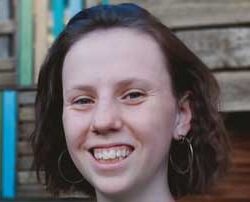
Alexa Stuart loved her ethics lessons when she was in primary school. A decade on, the 18-year-old is back at her former school teaching a new generation of ethics students.
In April, I taught my first ever ethics lesson! I had a gorgeous bunch of Year 2 kids at Lambton Public School, and – despite my nerves – it went really well. But actually it wasn’t my first ever ethics lesson. My first was in that very same school, in 2012 when I was just eight years old.
Our school was one of the earliest schools in Newcastle to start teaching ethics so for the latter part of my primary school years I was able to attend ethics classes. I remember loving it so much, I think I used to annoy my friends because after class I would just want to keep talking about the ethical dilemmas. I had so much to say and there was never enough time in ethics, so I just kept talking as we went out into the playground. And then when I got home, sometimes I would keep talking about it to my family over dinner.
One of my most vivid memories of ethics was in Year 5 or 6 when our ethics teacher stepped out of the circle and allowed us to moderate the discussion ourselves. She watched us as we tried to navigate how to take it in turns without putting up our hands. We were forced to talk to each other rather than just the teacher. I remember feeling so mature and that our teacher really respected us and trusted us.
Ethics lessons were a highlight of primary school for me. Last year I graduated from high school, and this year I’m taking a gap year, so I thought it would be a great opportunity for me to volunteer and become an ethics teacher!
When I started doing my ethics teacher training, I started remembering a lot of the topics and scenarios that we did when I was younger. I remembered talking about palm oil and the orangutans, about performance-enhancing drugs and whether it’s OK to hunt sharks after they have hurt humans. Back then, I thought that if I just thought about it hard enough, I could figure out the “correct” answer to all these tricky questions. Now I realise that the whole purpose of ethics is to learn the skills of
critical thinking and ethical problem-solving that help you to come to your answer, not the answer itself. It’s about the journey not the destination.
When I went back to my old school for my first lesson, I spoke to some of my old teachers. It was lovely to see them again and chat to them about what I’d been doing over the past few years. It felt so strange and nostalgic to be back at my primary school and I was very nervous, but once in the classroom I was surprised at how well the students listened to me. I was a bit worried that because I’m so young I would lack some authority and I was worried that the kids wouldn’t be fully engaged. But I needn’t have worried because they all seemed to have a great time. A lot of hands went up whenever I asked a question and despite them being a bit wriggly at times, they gave some very thoughtful (and cute!) answers.
It’s been strange to experience the other side of ethics classes, this time as the teacher. Having to remain neutral and lead the discussion rather than contributing my own thoughts can be a challenge. I feel very lucky to have experienced ethics as both the student and the teacher, and now I’m trying to convince some of my friends to volunteer, it’s such a great experience for young people!
Next year I’ll probably go to university, I think I will do development studies as I’m interested in social justice, development and inequality. Hopefully I’ll still have enough time to keep teaching ethics!